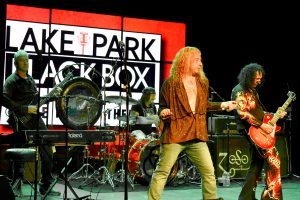
One could seemingly throw a rock in any direction recently and hit a musical tribute act in South Florida. Which often doesn’t seem like a bad idea, especially when considering the numerous ones honoring artists and bands that are still actively recording and touring themselves.
But New York City quartet The PreZence (www.facebook.com/ThePrezence), in offering “An Authentic Led Zeppelin Experience,” at least pays tribute to the once-mighty group that disbanded more than 40 years ago after the 1980 death of its drummer, John Bonham.
The PreZence was in the area recently to record video at the Hard Rock Hotel & Casino in Hollywood for the musical TV series Clash of the Tributes, opposing fellow Big Apple Zeppelin tribute act Hammer of the Gods. The two-season, 26-part series is set to debut on PBS affiliates this fall.
The group then made another tour stop at the Lake Park Black Box @ The Kelsey Theater on May 21. But perhaps due to lingering fears of COVID-19 at the indoor venue, and steep ticket prices that eclipsed $30 after fees and taxes, only 25 people showed up — making social distancing easy and face masks decidedly optional in a room that can easily hold six times that many patrons.
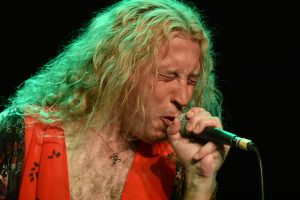
So vocalist Chris O’Loughlin, guitarist Kevin Slover, bassist/keyboardist/vocalist Ted Chmura, and drummer Sal DeMeo could be forgiven for being taken aback by a room featuring more empty than full seats, a shock that caused them to take a while to settle in.
“You sound like 10,000 people,” O’Loughlin said wishfully after the quartet took the stage. “And you feel like 10,000.”
Slover used a violin bow on his Gibson guitar a la Jimmy Page, and DeMeo thundered on his two tympanis like Bonham, to introduce the atmospheric opener “In the Evening,” the night’s lone track from the final Zeppelin album In Through the Out Door (1979). But an accelerated tempo thereafter took away from the heaviness of the original recording.
The guitarist then played an abrupt segue, the unaccompanied solo from “Heartbreaker” (from Led Zeppelin II, 1969), before the band ventured into the funky “Custard Pie” (Physical Graffiti, 1975). All featured Chmura playing keyboards while adding left hand bass notes, yet all were also plagued by misplaced accents between Slover and DeMeo.
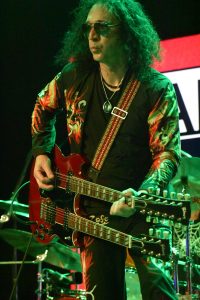
Chmura switched to bass, and added backing vocals, on the rocking “Communication Breakdown” (Led Zeppelin, 1969), signaling a shift into the evening’s strongest material — even if it was also some of Zeppelin’s most difficult to recreate. O’Loughlin, originally distracted by his vocals distorting in the monitors, relaxed as the sound improved and consistently mimicked singer Robert Plant’s strong upper-register vocals afterward.
“Black Dog” (Led Zeppelin IV, 1971) effectively employed the intro from the second album’s “Bring It On Home” — the same arrangement Zeppelin used on the soundtrack to its 1976 concert film The Song Remains the Same — with Chmura navigating the ever-underrated John Paul Jones’ inverted, complex bass figures.
“You all know who Simon Kirke is, right?” O’Loughlin asked. “The drummer for Bad Company? Well, he got credit for describing Led Zeppelin’s music as ‘blues on steroids.’ But I actually came up with that first.”
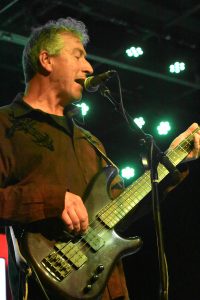
The band then dove into “In My Time of Dying” (Physical Graffiti), the slide guitar showcase on which Slover, Chmura and DeMeo conjured up the rhythmic mastery of Page, Jones and Bonham — even if its rapid tempo more recalled the version from the Knebworth Festival, Led Zeppelin’s final live performance from 1979 in England.
“Now this is my idea of a Friday night,” O’Loughlin exclaimed afterward. “F*#! COVID!”
“Nobody’s Fault But Mine,” from the 1976 Presence release that gave this band its name, furthered the trademark blues updates, with Chmura playing bass with a pick like Jones sometimes did. Slover then donned a customized double-neck guitar, utilizing the 12-string portion for the rollicking “The Song Remains the Same” and the six-string for the lush ballad “The Rain Song” (both from Houses of the Holy, 1973). The latter, with Chmura recreating Jones’ orchestral Mellotron keyboard parts and DeMeo utilizing an oversized gong for effect, may have been The PreZence’s best overall performance.
The drummer then got his unaccompanied showcase on Bonham’s signature piece, “Moby Dick” (Led Zeppelin II). Playing first with his drumsticks, then with his bare hands, DeMeo effectively channeled Bonham’s mix of theatrics, bombast, and rhythmic genius.
Still, his Ludwig Vistalite acrylic drums lacked the punch of Bonham, who used wooden drums on recordings, and whose mammoth live sound on those see-through drums was the product of his own artistry and the engineering talents of Page.
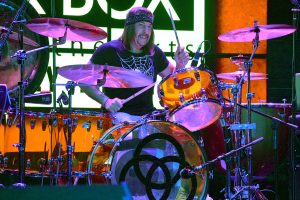
The epic tracks “Kashmir” (Physical Graffiti) and “Stairway to Heaven” (Led Zeppelin IV) were both subsequent highlights, each with Chmura on keyboards and the latter with Slover playing his double-neck again.
“Whole Lotta Love” (Led Zeppelin II) closed the main portion of the show with the extended version from The Song Remains the Same, and worked up until Slover lost the signal to his theremin, the bizarre electronic instrument that a player controls with their hands by manipulating sound waves between two antennas without actually touching them.
The first encore was the predictable “Rock and Roll” (Led Zeppelin IV), but The PreZence ended its 90-minute showcase with a less-expected gem. The singalong “The Ocean,” from Houses of the Holy, gave O’Loughlin a chance to trade late vocal chants with the small but willing crowd, followed by its signature walking bass line outro and blues on steroids coda.